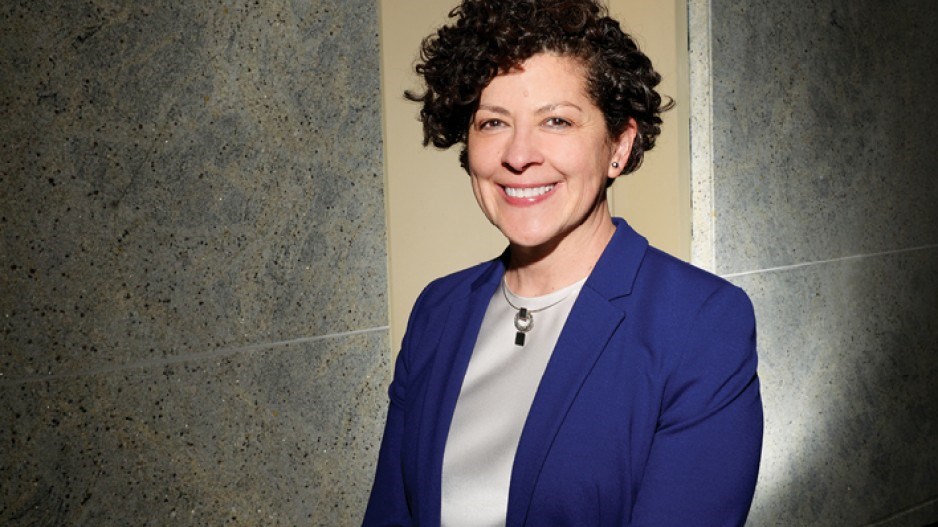When the first generation of mines was built in British Columbia, the only "licence" a miner needed was to stake a claim.
Later, mines would need environmental assessment certificates and federal Environmental Assessment Act approvals to get a mine permit.
Today, mining companies also need a broader "social licence" to build a new mine, which includes getting First Nations on board.
That may explain why the Mining Association of BC (MABC) chose someone with a background in social services rather than mining as their president in 2011.
Karina Briño didn't study geology or even business, and her early career was not in mining, but in social work. Her degrees are in psychology and Spanish literature from the University of B.C. and University of Santiago.
"My heart really is in eradicating poverty and dealing with social issues," she said. "I care about the environment and social issues as much as any of those people that sometimes are opposing mining projects because I think there is a tremendous contribution that this industry can make."
Briño is not entirely without mining bona fides, however. She was born and raised in Chile, where mining is a major employer.
"My grandfather worked in a coal mine in Chile, and I come from a very strong mining culture," she said. "[Because] I was born and raised in a mining country that is very much in tune with where the money comes from, I think I probably have a stronger mining culture than most people here in Vancouver."
Briño was 14 when her parents moved to Canada. They spent a couple of years in Winnipeg before the harsh winters brought them to B.C. After earning her university degrees, she volunteered as a settlement worker in Vancouver, helping fellow Chilean immigrants adapt to their new country. Her community work eventually landed her a job with the Ministry of Social Services, where one of her jobs was helping people on income assistance get back into the workforce.
She also worked with youth at risk.
"I got very interested in public policy development," she said.
She moved to Victoria, where she led the Labour Operations Branch for the Ministry of Social Services, and then worked for the Ministry of Children and Family Development. She was good at public policy development and worked in several ministries. In 2004, the Ministry of Energy and Mines was developing its mining plan, which had good technical information but lacked policies for engagement with communities and First Nations. Briño was seconded to Energy and Mines as director of policy to help develop a community engagement plan.
"As a result of that work, I got to know the industry quite well," Briño said.
One of the plan's directives was to increase employment for aboriginal people in mining, particularly youth. Briño's job included lobbying the federal government for funding for job training in northern B.C. She worked with Northwest Community College to develop new trades training programs designed to give First Nations in northern B.C. skills to work in the resource sectors.
"I think our statistics now are about 6% aboriginal participation [in mining]," Briño said.
Briño became the executive director of policy for the mines and minerals division of Energy and Mines in 2006, and later became executive director of regional operations. The job required travelling around B.C. to meet with mining inspectors.
"It was in regional operations where I got to really understand and learn what happens on the ground," she said. "With that experience I also got to know a lot of the industry people."
She went on to become assistant deputy minister of the mines and minerals division of Energy and Mines in 2010. In 2011, the MABC let her know it was looking for a new president and CEO.
The organization had adopted the sustainable mining initiative developed by the Mining Association of Canada and was looking to implement stronger social licence performance measures for its members.
It was Briño's accomplishments and connections in the Energy and Mines Ministry that got her the job as president and CEO.
"What really appealed to the association and to me on the committee that was looking at hiring her was that she really had a very strong and compelling understanding about how the mine industry can benefit communities and the province at large," said MABC chairman Scott Broughton. "She was extremely well respected in her ministries and she had great connectivity to the government, too. That's proved to be highly beneficial to the association in respect to understanding how government works."
When she saw the association was serious about implementing the sustainable mining initiative in B.C., Briño said, "I was completely interested in this."
Mining is still very much a male-dominated industry, so it is unusual for a woman to head an association that represents mining companies.
"This organization was founded in 1901," Briño said. "I'm the first woman to be the president. Women are still under-represented in the boardrooms."
As president of MABC, Briño's job is to work with the organization's 50 members, the government and the public to ensure mining policies in B.C. are fair, transparent and understood.
"But my biggest interest is ensuring that we, as a society, understand that this industry has a very significant contribution to make when it comes to some of the social issues that we're facing," she said.
Briño's own son, who is 21, has had summer jobs working at B.C. mines.
"He worked at Copper Mountain for a summer, and he worked at Mount Milligan last year." Briño said. "If I'm willing to let my child go work at a mine site, it's because I believe it's a pretty good place to be in."




